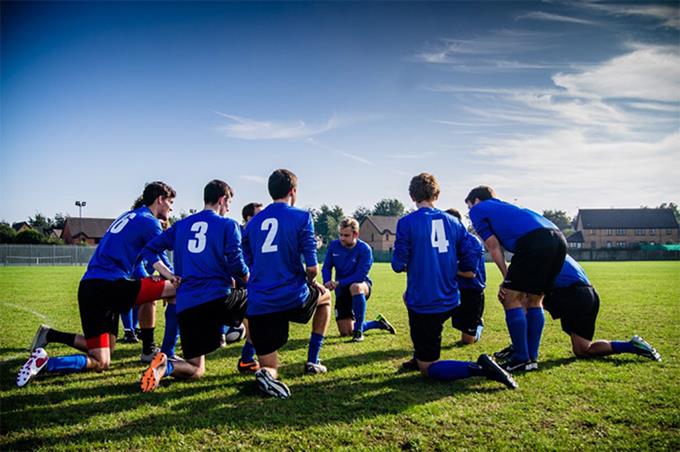Heart racing, body aching, and gasping for breath – you remind yourself that there’s no quitting now. You have already played your heart out for the last 60 minutes, but your team is counting on you.
You close your eyes, take a deep breath and refocus your mind because it all comes down to this moment. What happens next can be the difference between success and defeat. You find your composure and dig deep.
High intensity moments like these are common in the competitive sports arena, but we sometimes forget that these experiences translate into real-world learning opportunities. Athletes – especially student-athletes – sometimes fail to see how the benefits of participating in athletics weave into our everyday lives.
Situations that unfold between the goal posts, on the oval, or under the net very often mimic the competition-like settings that also challenge us off of the field. These situations can include getting ready to give an important presentation, working tirelessly to balance a hectic work-life situation, or even trying to cut that extra weight around the mid-line.
So how do these similar, but contextually different, challenges connect? How does training and competing for sport translate into our everyday lives off the field?
1. Dealing with Defeat
As I was preparing this article, I received the news that I had not been accepted into a highly sought-after opportunity. I found the disappointment to be very unsettling, causing my mind to jump in a million different directions. Doubts clouded my thinking – I wondered if I was good enough.
But many successful athletes are trained into optimism, so that your mind refuses to dwell on the setbacks. Just as you would in an athletic competition where you may have dropped that important pass, missed that critical shot, or suffered an unfortunate injury, you accept in life that stuff happens, and that tomorrow is another day. The idea of quitting and hanging up the cleats is actually not on the table; getting back on the practice field is the only option.
The more you are able to find composure and success on the playing field in those tipping-point moments, the likelier you will be able to find your composure and success off the field when something doesn’t go as planned.
A person only has two options in life; they can either pursue their dreams or quit. – Coach AK
2. Delayed Gratification
If you only enjoy activities that offer immediate results, then athletics may not be for you. In most situations, you will likely encounter pain and struggle before you start to see the fruits of your labor. In life, just like when lifting weights, the only way to get stronger is to lift heavier weights and tear some muscles. Only when you push yourself through the pain can new heights be reached.
As athletes, we aware of the likelihood of encountering pain and slow progress in the short term when chasing a dream. As an athlete, you learn that it takes time to see real results. The only way to get there is to embrace the long-term journey and to adopt an unwavering work ethic.
3. Teamwork
Whether you compete in a team sport like soccer or an individual sport like track and field, the people you surround yourself with are one of the greatest determinants of your success.
No two minds ever come together without a third invisible force, which may be likened to a “third mind.” When a group of individual minds are coordinated and function in harmony, the increased energy created through that alliance becomes available to every individual in the group. – Napoleon Hill
The teamwork built through sport translates into successful team dynamics and leadership off of the field. Athletes understand the necessity of working together and realize that a greater impact can be achieved as a collective, rather than working only independently or in isolation.

4. Self-Realization
The connection between practice and competition is best characterized as a love-hate relationship. The practice is an athlete’s homework, while the competition is their test.
Competition offers a moment of self-realization, standing as an “I told you so” that underscores what has or has not been built through practice. When sweat and blood transform into winning, it’s easier to appreciate those long hours of dedication.
However, it’s often the daily grind that happens behind the scenes – once the athlete steps off the winner’s podium and gets back to work – that goes unrecognized. When it comes down to it, the only person who truly cares about who you are during practice, is you.
No one cares if you made 10 three-point shots in practice if it doesn’t transfer into the game. Similarly, in the real world, no one cares how hard you work if you don’t produce results.
Your bosses aren’t concerned that you were up all night working on the presentation; they’ll judge your work only by what is presented. Were you able to blow the client away or did you flounder it the midst of pressure?
The results are usually what people evaluate, not the process; however, it’s the work you put in behind the scenes that will inform your ultimate evaluation.
5. A Winning Mindset
As you move up the competitive ladder from amateur to professional athletics, your mind becomes the most important muscle that you train. In college and in the pros, everyone trains at a high intensity. Everyone commits equal time in the weight room and the practice fields, hoping to maximize their athletic potential.
I’m always get asked, “But if this is the case, then why is it that competition results vary so greatly on game day?” As a former professional track and field athlete, I understand that defeat at the finish line usually begins in the starting blocks.
True champions find the warrior mindset before the gun even goes off, the ones who envisioned themselves crossing the finish line first. If persistent training and incredible hard work build the base for success, it is the competitive mindset that uncovers the athletes who are the final winners.
6. Work/Life Balance
If you have participated in any type of athletics during the academic season, then you understand the work-life balance you must juggle when it comes to improving your athleticism, your grades, and your social life. Did I forget to mention sleep?
As student-athletes, learning to manage your time effectively is quite beneficial. Everyone has different strategies to overcome procrastination and ways of re-ordering their lives to make sure they can complete important tasks, foster close relationships, and enjoy personal time.
When you have a family and in the workforce, that balance can be even more difficult to manage. Working to find ways to master this juggling act early on can save you time and frustration.
7. Leadership and Community
As the Founder and President at Empower2Play, and working with several high school students through our Global Ambassador program, I have seen how leadership and building connections come naturally to great student-athletes of any age.
Athletics has a way of bridging communities, overlooking differences and getting everyone working together for a shared vision. Sports teach individuals to consider the well-being of the team over their own success. Maybe that’s why for centuries, sports have been used as a vehicle to bring communities together from all walks of life.
The 2016 Olympic games was a celebration of not only athleticism, but also sacrifice, determination and peace. Through athletics we learn how much we are truly one, global family. And at this time in our world, finding innovative ways to bring communities together couldn’t be more needed.
If sports were an influential part in your life, or if you have additional life skills gained which were not included in this list, please message me on CoachUp. Always excited to collaborate!
How useful was this post?
Click on a star to rate it!
Average rating 5 / 5. Vote count: 1
No votes so far! Be the first to rate this post.




